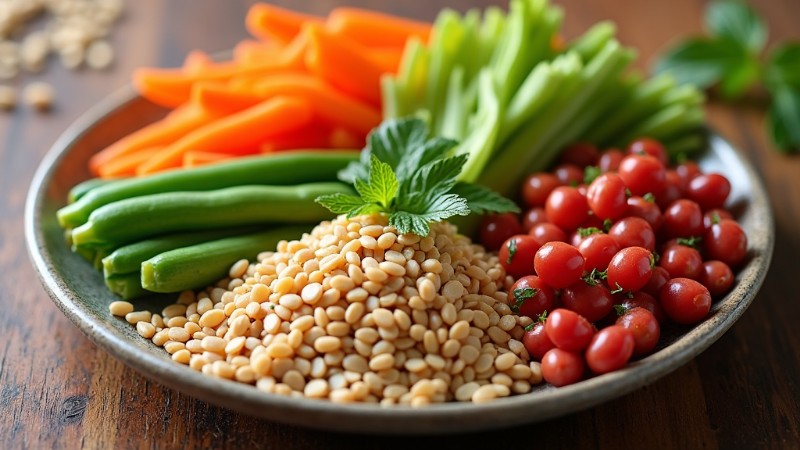Maintaining proper nutrition becomes increasingly important as we age. The body’s needs evolve, and seniors must adjust their eating habits to promote overall well-being and mitigate the risk of chronic diseases like heart disease, diabetes, and osteoporosis. Both general dietary principles and age-specific considerations can play a critical role in improving a senior’s quality of life.
Tailoring nutrition for older adults
As we age, specific nutrient needs increase. Calcium is vital for strong bones and teeth, so include low-fat dairy, leafy greens, tinned salmon, and almonds in your diet. Protein is essential for preserving muscle mass, so aim for lean meats, fish, eggs, tofu, and legumes daily.
Older adults should consume a variety of foods from all five food groups: vegetables, fruits, grains, lean proteins, and dairy. A balanced diet should feature colorful vegetables, whole grains, lean meats, and reduced-fat dairy to provide essential vitamins, minerals, and fiber. Additionally, drink six to eight cups of fluid daily to prevent dehydration.
Nutritional changes in aging adults
Although many know the basics of healthy eating, the nutritional needs of older adults change as they age. Our bodies require fewer calories but more essential nutrients, making it vital to choose foods rich in nutritional value.
Here are healthy eating and diet tips tailored for older adults to help them stay energetic, meet their nutritional needs, and avoid health risks.
Prioritize key nutrients: Nutritional needs change with age, so it’s crucial to prioritize the right nutrients. A balanced diet should include lean proteins (such as poultry, seafood, and beans), whole grains, low-fat dairy, and plenty of fruits and vegetables. Focus on foods high in fiber and Vitamin D for better digestion and bone health, while avoiding processed foods high in sodium, which can lead to hypertension and other health issues.
Portion sizes and energy needs: As people age, calorie needs often decrease due to reduced physical activity and muscle mass, even as nutrient requirements may remain the same or increase. To address this, practice portion control: aim for 75 grams of vegetables per serving and 150 grams of fruits. Additionally, ensure that at least two-thirds of your grain servings are whole grains.
Healthy meal planning: Meal planning is essential for seniors to achieve nutritional goals and steer clear of unhealthy fast food. For those with mobility or budget limitations, stocking up on long-lasting items like canned vegetables, rice, and dried beans can simplify meal prep. Quick options like scrambled eggs with veggies, sardines on toast, smoothies, canned soups, grilled chicken with salad, and cheese with whole grain crackers provide easy access to nutritious meals.
Stay hydrated: Hydration is crucial for older adults, as dehydration can cause serious health issues. To stay hydrated, drink small amounts of water throughout the day and include hydrating beverages like herbal teas. Limit sugary or high-sodium drinks unless directed by your doctor.
Avoid refined sugars: Refined sugars can negatively affect seniors’ health, raising the risk of diabetes and cognitive decline. Swapping refined sugar for healthier options like honey, maple syrup, or pureed fruits can reduce sugar intake while maintaining flavor. However, seniors should limit these alternatives, as excessive natural sugars can also impact blood sugar levels.
Stay physically active: Regular physical activity, even light exercise, is essential for overall health. Aim for 30 minutes of daily activity, such as walking, gardening, or balance exercises. If you’re new to exercising, start slowly and increase intensity over time. A professional can help create a suitable exercise plan for you.
Special considerations
Aging health conditions can make chewing or digesting food more difficult. Soft-cooked vegetables, canned fruits, nut pastes, and milled grains are good alternatives. To counter appetite loss, focus on nutrient-dense foods like eggs, milk, cheese, and legumes, along with light snacks like yogurt, smoothies, and soups.
For those with arthritis, consuming fish twice a week or discussing fish oil supplements with your doctor may help alleviate symptoms. A balanced diet, regular physical activity, and social engagement are key to maintaining health and quality of life. Pay attention to portion sizes, ensure adequate protein, calcium, and vitamin D intake, and enjoy your meals. Seek guidance from healthcare professionals for tailored dietary and lifestyle advice.













